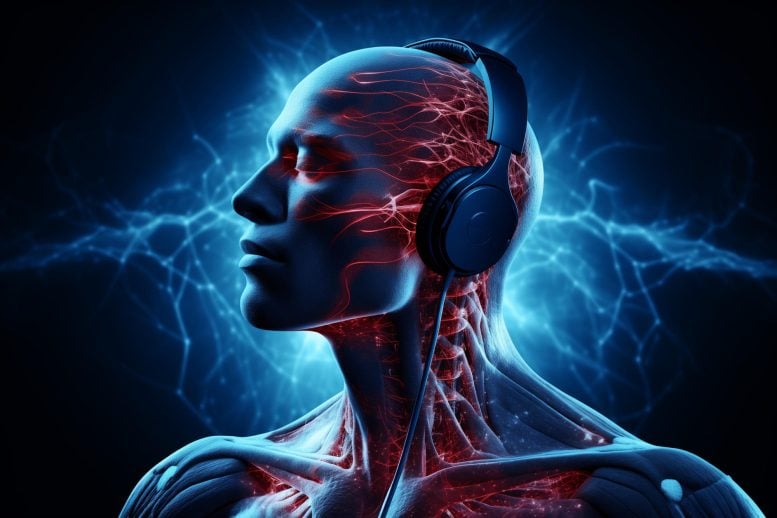
Researchers discovered that listening to our favorite music reduces both pain intensity and unpleasantness, insights that could optimize music-centered treatments for pain management.
Research indicates that music could serve as a non-pharmacological method to reduce pain perception in humans. This phenomenon, known as hypoalgesia, happens when the transmission of pain signals from their origin to the point where they are consciously acknowledged as pain is interrupted. Canadian researchers have recently conducted a study to explore which kinds of music help to dampen pain perception.
“In our study, we show that favorite music chosen by study participants has a much larger effect on acute thermal pain reduction than unfamiliar relaxing music,” said Darius Valevicius, a doctoral student at the Université de Montréal. The research was carried out at the Roy Pain Lab at McGill University and published in Frontiers in Pain Research. “We also found that emotional responses play a very strong role in predicting whether music will have an effect on pain.”
Everybody hurts (but less so when listening to favorite music)
To test which kind of music was most effective for reducing pain, participants received moderately painful thermal stimuli to the inner forearm, resulting in a sensation similar to a hot teacup being held against the skin. These stimuli were paired with music excerpts, each lasting approximately seven minutes.
Compared to control tracks or silence, listening to their favorite music strongly reduced pain intensity and unpleasantness in participants. Unfamiliar relaxing tracks did not have the same effect. “In addition, we used scrambled music, which mimics music in every way except its meaningful structure, and can therefore conclude that it is probably not just distraction or the presence of a sound stimulus that is causing the hypoalgesia,” Valevicius explained.
The researchers also examined if musical themes could modulate the pain-decreasing effects of favorite music. To do that, they interviewed participants about their emotional responses to their favorite music and assigned themes: energizing/activating, happy/cheerful, calming/relaxing, and moving/bittersweet. They discovered that different emotional themes differed in their ability to reduce pain.
“We found that reports of moving or bittersweet emotional experiences seem to result in lower ratings of pain unpleasantness, which was driven by more intense enjoyment of the music and more musical chills,” Valevicius said. Although it is not yet entirely understood what musical chills are, they seem to indicate a neurophysiological process that is effective at blocking pain signals. In some people, chills can manifest as a tingling sensation, shivers, or goosebumps.
Something for the pain
The researchers also pointed to limitations of their study, one of which is concerned with how long participants listen to music samples. For example, listening to relaxing music for longer might have stronger effects than the shorter tracks the participants listened to in this study. Questions that also need to be addressed in further research include if listening to favorite music is also effective with other, non-thermal pain stimuli, such as mechanical stimulation or chronic pain, the researchers said.
“Especially when it comes to the emotional themes in favorite music like moving/bittersweet, we are exploring new dimensions of the psychology of music listening that have not been well-studied, especially in the context of pain relief. As a result, the data we have available is limited, although the preliminary results are fairly strong,” Valevicius concluded.
Reference: “Emotional responses to favorite and relaxing music predict music-induced hypoalgesia” by Darius Valevicius, Anaïs Lépine Lopez, Ajar Diushekeeva, April Chaewon Lee and Mathieu Roy, 11 September 2023, Frontiers in Pain Research.
DOI: 10.3389/fpain.2023.1210572